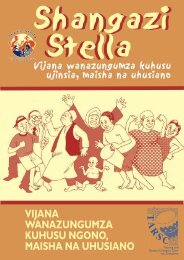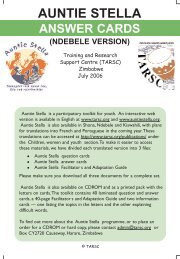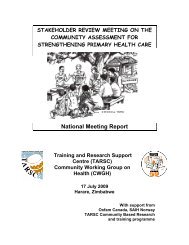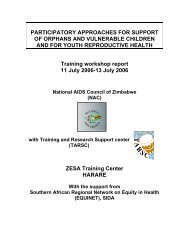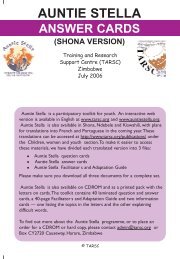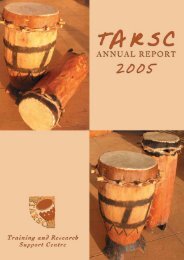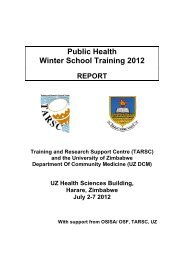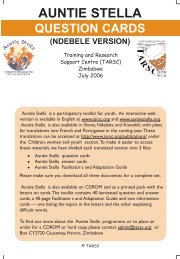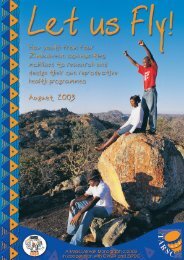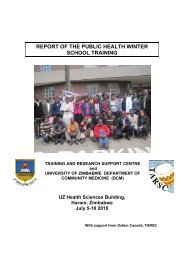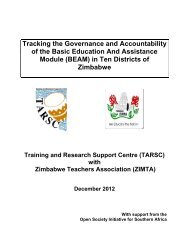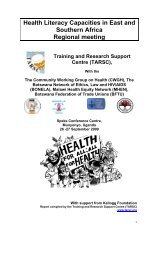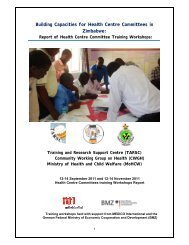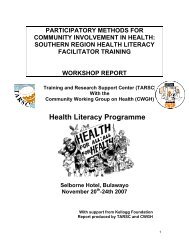WS07 REPORT.pdf - Training and Research Support Centre
WS07 REPORT.pdf - Training and Research Support Centre
WS07 REPORT.pdf - Training and Research Support Centre
You also want an ePaper? Increase the reach of your titles
YUMPU automatically turns print PDFs into web optimized ePapers that Google loves.
Executive Summary<br />
The University of Zimbabwe, Department of Community Medicine (UZ-DCM) together with the<br />
<strong>Training</strong> <strong>and</strong> <strong>Research</strong> <strong>Support</strong> <strong>Centre</strong> (TARSC), held for the third year the Public Health<br />
Winter School short course-training programme at UZ Health Sciences Building from the 9 th -<br />
14 th of July 2007.<br />
The structure <strong>and</strong> content of the course was based on the findings from a needs <strong>and</strong> capacity<br />
assessment carried out by the two institutions in 2005 <strong>and</strong> the feedback from the July 2005<br />
<strong>and</strong> July 2006 Winter School courses.<br />
The programme was aimed at building capacities for people working particularly at district<br />
level in health-related work, but who may not have had the benefit of formal training in health.<br />
The course included people from government, education, social welfare, from health related<br />
civil society, from researchers working at community level <strong>and</strong> parliament technical staff<br />
including reporters. The course aimed to build an underst<strong>and</strong>ing of public health <strong>and</strong> of health<br />
systems, particularly at district level. The course covered<br />
• Principles of public health <strong>and</strong> epidemiology<br />
• Major public health issues, including HIV <strong>and</strong> AIDS, TB, Malaria, nutrition<br />
• Elements of health systems, health financing, essential drug supplies <strong>and</strong> human<br />
resources for health<br />
• Zimbabwe’s health services at national, district <strong>and</strong> primary healthy care level<br />
• Community <strong>and</strong> non health sector roles in health<br />
An open invitation was made for applicants <strong>and</strong> of the pool of 50 applicants a total of 29<br />
people were accepted <strong>and</strong> 27 participants attended the course, 20 women <strong>and</strong> 7 men.<br />
Participants included district level officers from various government ministries, non<br />
governmental organisations, civil society <strong>and</strong> research organisations working on HIV <strong>and</strong><br />
AIDS programmes <strong>and</strong> reporters from the parliament of Zimbabwe. Participants came from or<br />
worked in various districts across the country. There were enquiries from foreign students<br />
some from as far as Nigeria but these could not be taken on this year as they all needed<br />
sponsorship.<br />
The resource persons <strong>and</strong> facilitators for the course came from the University of Zimbabwe,<br />
<strong>Training</strong> <strong>and</strong> <strong>Research</strong> <strong>Support</strong> <strong>Centre</strong>, Ministry of Health <strong>and</strong> Child Welfare, National AIDS<br />
Council of Zimbabwe, Food <strong>and</strong> Nutrition Council of Zimbabwe, Non governmental<br />
organisations (CWGH, WAG) Parliament of Zimbabwe <strong>and</strong> City of Harare Health Department.<br />
Sessions were accompanied by h<strong>and</strong>outs <strong>and</strong> course materials. Two assignments were done<br />
by the students in groups to test their public health <strong>and</strong> health systems knowledge. The<br />
second assignment also involved development <strong>and</strong> feedback on a community based project.<br />
This will be followed up on to support community level research skills.<br />
Students completed a course evaluation form at the end of the training to give feedback on<br />
the strengths <strong>and</strong> weaknesses of the training. The evaluation indicated that students found<br />
the course relevant to their work <strong>and</strong> the course useful. Students rated trainers <strong>and</strong> materials<br />
as good. The majority of students understood the lectures, <strong>and</strong> found the h<strong>and</strong>outs <strong>and</strong><br />
assignments clear <strong>and</strong> appreciated the Zimbabwe relevant content. For future courses<br />
students proposed the inclusion of various other topics not covered especially introduction to<br />
research methods <strong>and</strong> grant proposal writing. The course included discussion on further<br />
training opportunities for these areas. Various subjects were also suggested for the proposed<br />
follow up advanced course.<br />
An end of course test was completed with all students passing. The Dean of the School of<br />
Medicine Prof MM Chidzonga gave closing remarks <strong>and</strong> h<strong>and</strong>ed out Certificates of completion<br />
to students marking the end of the Course.<br />
2



